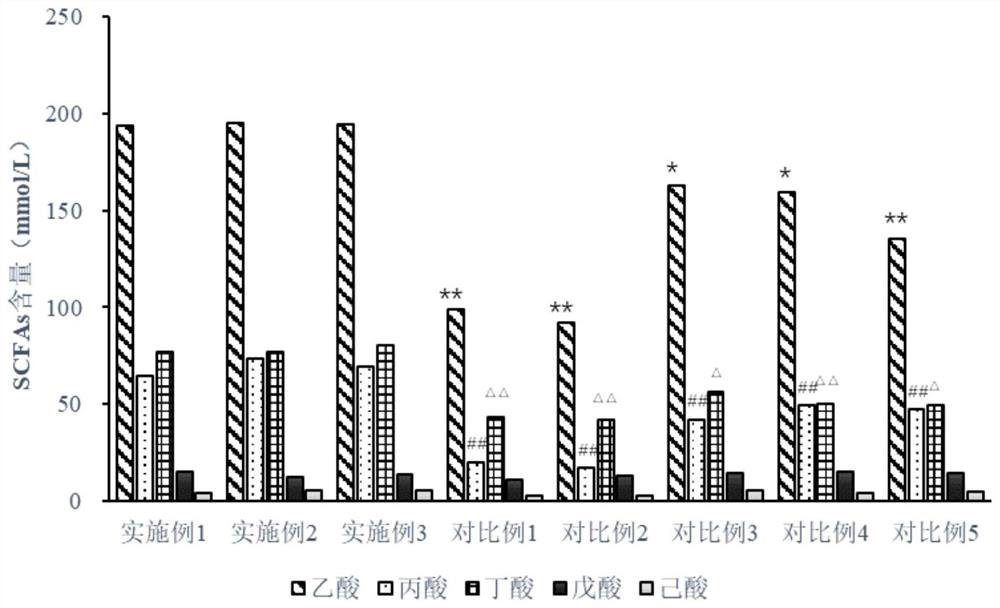Method for highly producing short-chain fatty acid by utilizing microbial symbiotic fermentation technology
A short-chain fatty acid and symbiotic fermentation technology, which is applied in the field of microorganisms and can solve problems such as difficult applications
- Summary
- Abstract
- Description
- Claims
- Application Information
AI Technical Summary
Problems solved by technology
Method used
Image
Examples
Embodiment 1
[0033] A method for high-yielding short-chain fatty acids using microbial symbiotic fermentation technology, comprising the following steps:
[0034] 1) Jerusalem artichoke pretreatment: wash 50kg of fresh Jerusalem artichoke, after the water on the surface is naturally dried, put it into a beater for beating, beat at 20Hz for 10 minutes, and obtain Jerusalem artichoke pulp;
[0035] 2) Seaweed pretreatment: Wash 50kg of seaweed, and after the moisture on the surface dries naturally, cut it into 2-5cm long and 2-5cm wide blocks, and dry it in a blast drying oven (70°C) until the water content is 10%, placed in a grinder to grind to 60 mesh, and sieved to obtain seaweed powder;
[0036] 3) Preparation of fermented pulp medium: take 10 kg of Jerusalem artichoke pulp prepared in step 1), 2 kg of seaweed powder prepared in step 2), and 0.1 kg of sodium glutamate, disperse in 87.9 kg of water, mix, and homogenize under a pressure of 20 MPa for 8 minutes , adjust the pH to 6, keep it...
Embodiment 2
[0040] A method for high-yielding short-chain fatty acids using microbial symbiotic fermentation technology, comprising the following steps:
[0041] 1) Jerusalem artichoke pretreatment: wash 50kg of fresh Jerusalem artichoke, after the water on the surface is naturally dried, put it into a beater for beating, beat at 20Hz for 10 minutes, and obtain Jerusalem artichoke pulp;
[0042] 2) Seaweed pretreatment: Wash 50kg of seaweed, and after the moisture on the surface is naturally dried, cut it into 2-5cm long and 2-5cm wide blocks, and dry it in a blast drying oven (70°C) until the moisture content is 10%, placed in a grinder to grind to 60 mesh, and sieved to obtain seaweed powder;
[0043] 3) Preparation of fermented pulp medium: take 20 kg of Jerusalem artichoke pulp prepared in step 1), 5 kg of seaweed powder prepared in step 2), and 0.5 kg of sodium glutamate, disperse in 74.5 kg of water, mix, and homogenize under a pressure of 20 MPa for 8 minutes , adjust the pH to 7,...
Embodiment 3
[0047] A method for high-yielding short-chain fatty acids using microbial symbiotic fermentation technology, comprising the following steps:
[0048] 1) Jerusalem artichoke pretreatment: wash 50kg of fresh Jerusalem artichoke, after the water on the surface is naturally dried, put it into a beater for beating, beat at 20Hz for 10 minutes, and obtain Jerusalem artichoke pulp;
[0049] 2) Seaweed pretreatment: Wash 50kg of seaweed, and after the moisture on the surface is naturally dried, cut it into 2-5cm long and 2-5cm wide blocks, and dry it in a blast drying oven (70°C) until the moisture content is 10%, placed in a grinder to grind to 60 mesh, and sieved to obtain seaweed powder;
[0050] 3) Preparation of fermented pulp culture medium: 40 kg of Jerusalem artichoke pulp prepared in step 1), 10 kg of seaweed powder prepared in step 2), and 1 kg of sodium glutamate were dispersed in 49 kg of water, mixed, homogenized under a pressure of 20 MPa for 8 min, and adjusted The pH ...
PUM
 Login to View More
Login to View More Abstract
Description
Claims
Application Information
 Login to View More
Login to View More - R&D
- Intellectual Property
- Life Sciences
- Materials
- Tech Scout
- Unparalleled Data Quality
- Higher Quality Content
- 60% Fewer Hallucinations
Browse by: Latest US Patents, China's latest patents, Technical Efficacy Thesaurus, Application Domain, Technology Topic, Popular Technical Reports.
© 2025 PatSnap. All rights reserved.Legal|Privacy policy|Modern Slavery Act Transparency Statement|Sitemap|About US| Contact US: help@patsnap.com

